Manager 10.5 Release Notes
September 10, 2021
OAuth 2 support for qTest
Tricentis qTest now supports OAuth 2.0 for our APIs. With this enhancement, administrators can configure expiration timeouts for the API Access Token using the new Authentication Settings section on the Security tab of the Administration screen. Select the Access Token Expiration check box and enter a time to indicate that the Access Token should expire after the set time.
For example, select the Access Token Expiration check box to enable an expiration time for the Access Token. Then enter 3 and select Hours to indicate that the Access Token should expire after three hours.

When an expiration time is configured for the Access Token, a Refresh Token appears on the in the API & SDK section of the Download qTest Resources screen. A Refresh Token and the expiration time of the Access Token will also be returned by the postAccessToken API. The Refresh Token is used to renew the Access Token. You can configure an additional expiration time for the Refresh Token using the Refresh Token Expiration check box.
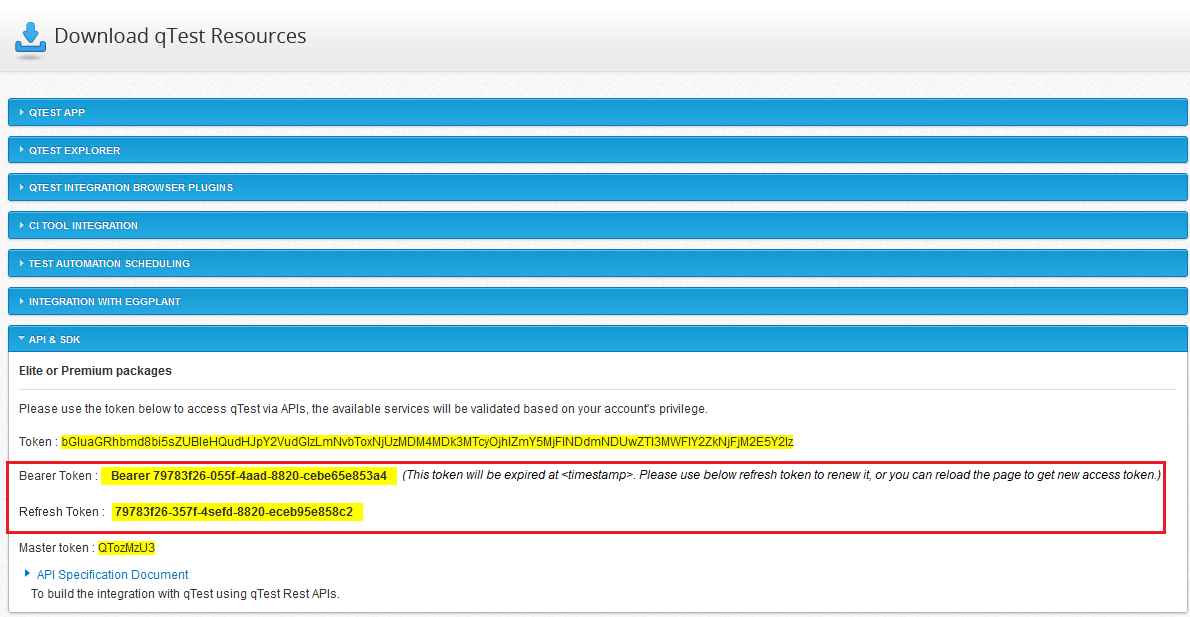
In addition, a new postAccessToken API has been added to:
-
GET the status of an Access Token if provided with the Token
-
POST request to refresh the Token, if provided with the Refresh Token
Links between Test Cases and Requirements now supported for versioning
You can now track the link between a Test Case and a Requirement per Test Case version, allowing you to sort Requirements based on version. This feature can be activated using the new Track Test Case - Requirement Link Per Test Case Version section on the Test Case Settings screen. When this feature is activated, linking or unlinking Requirements will increase the Test Case's minor version.
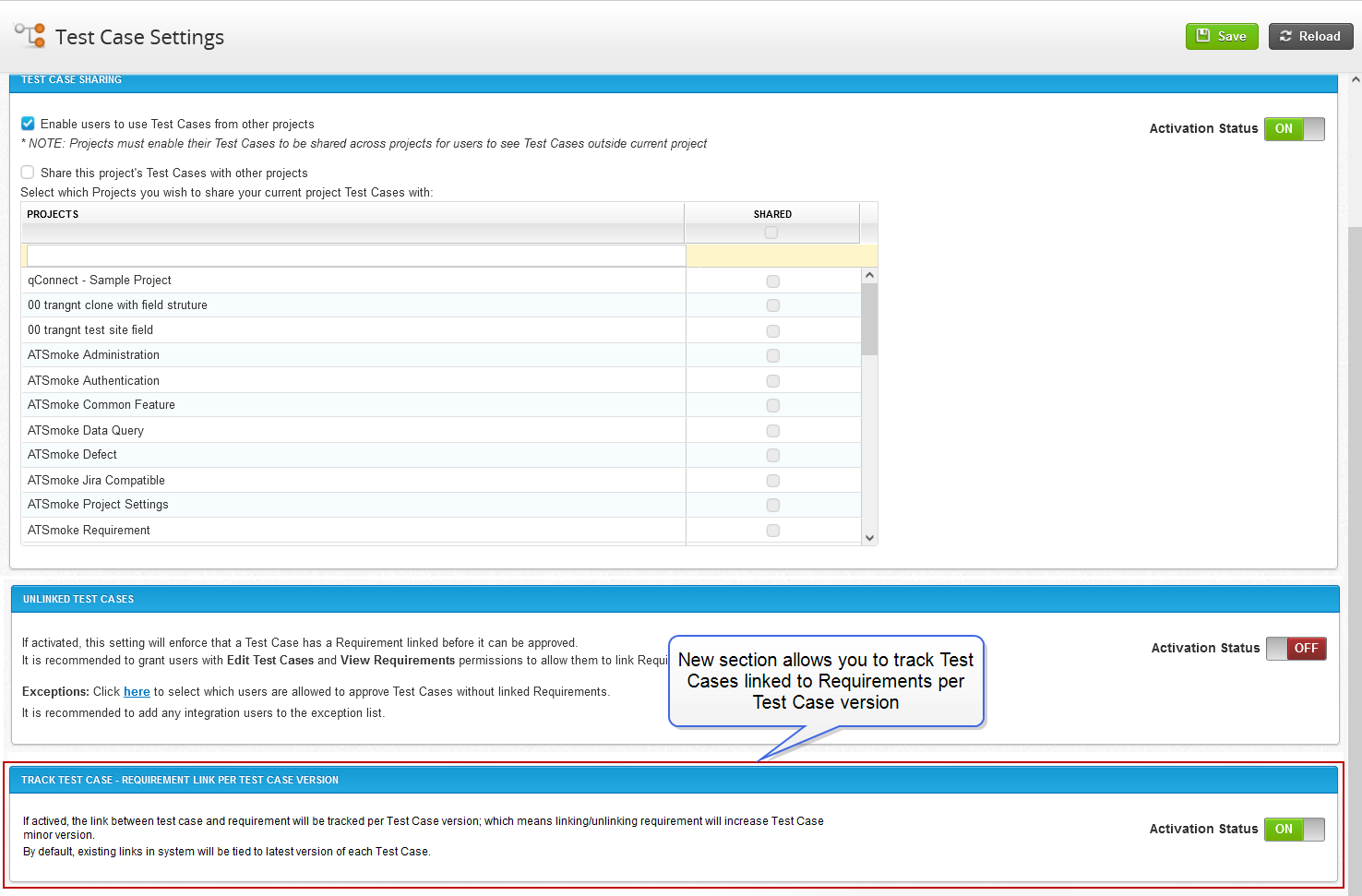
When this option is activated, existing data will be migrated to the new versioning. By default, all existing links will be associated with the most recent Test Case version. During the data migration, users will be unable to link or unlink Requirements to Test Cases. Once the migration is complete, a message will appear on the Test Case page or the Test Run page, prompting users to refresh their connection to see the latest data.

Following are the areas that have been updated to reflect the new versioning, if the option is activated. The updated areas are listed in no particular order.
-
Data Query. Linked Requirements will appear in data queries for associated Test Runs based on the Test Case version. If the Requirements column is added to the Query Result table, only linked Requirements for the specific Test Case version appear in the column.
-
Excel export. Linked Requirements will appear in Test Run details that are exported to Microsoft Excel.
-
Test Cases and Requirements report. The Version column on the Test Cases and Requirements report will display the Test Case version that the Requirement is linked to.
-
Test Case history. Any changes to a Test Case, including linking or unlinking Requirements, will be recorded in the Test Case's history.
-
Test Case page. A new Linked At Version column has been added to the Requirements tab on the Test Case page to display the Test Case version for which the Requirement was linked.
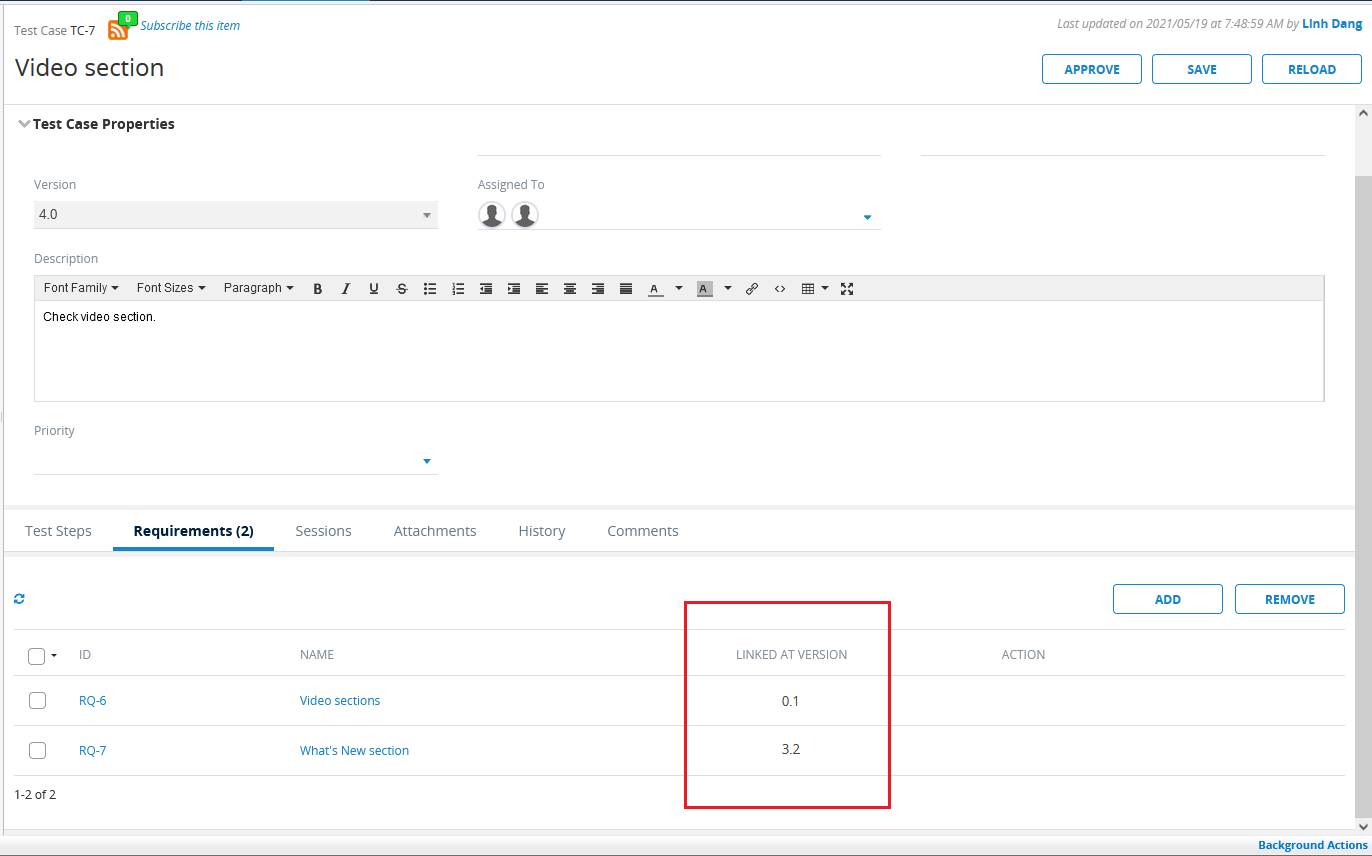
-
Test Run page. Requirements linked to a Test Case version appears on the Requirements tab on the corresponding Test Run page.
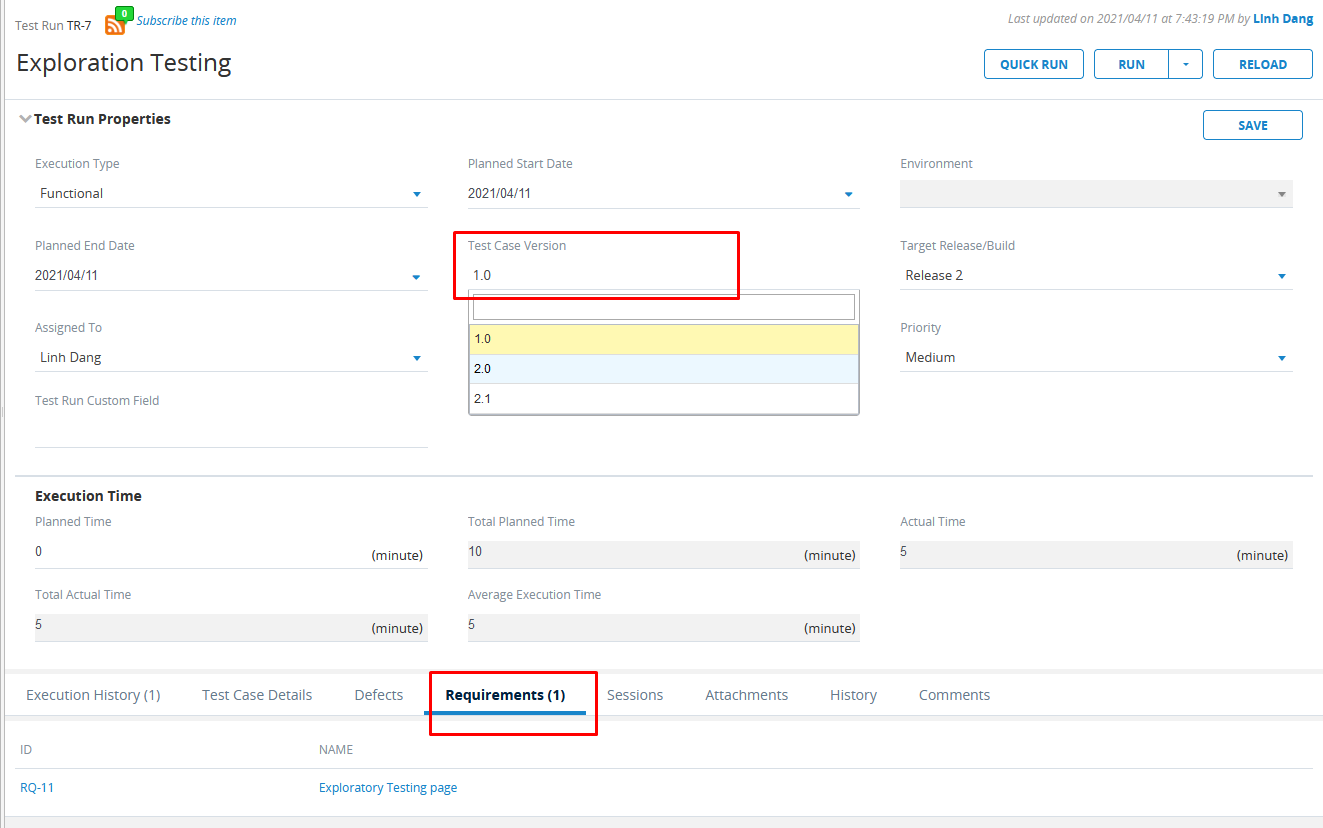
-
Test Run grid. If the Requirements column is included in the Test Run table on various object pages, the linked Requirements appear in the column.
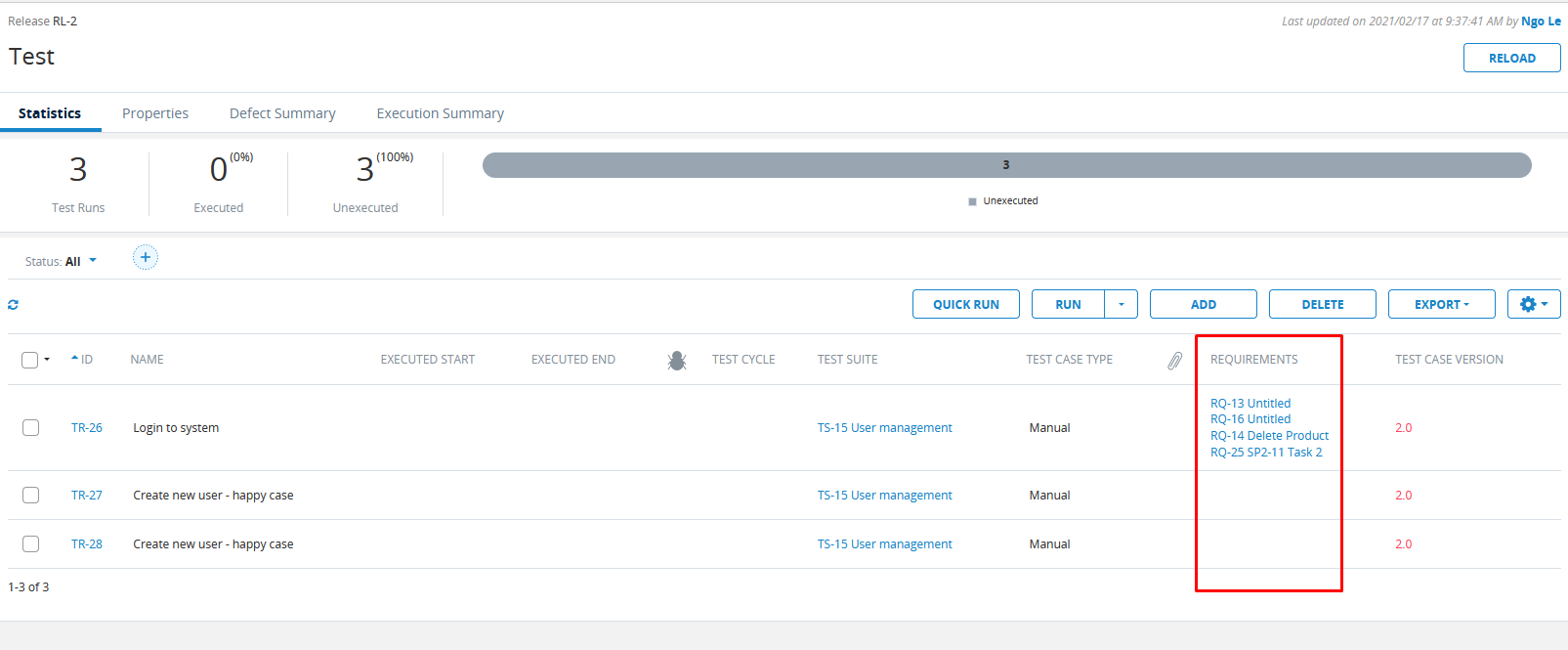
Vera integration only
If you have integrated qTest Manager with Vera and the new Track Test Case - Requirement Link Per Test Case Version section is activated, Test Cases that are routed to Vera for approval will be locked. When a Test Case is locked, users cannot complete the following actions using APIs or the qTest UI.
-
Users will be prevented from deleting Requirements that are linked to locked Test Cases.
-
Users will be prevented from linking or unlinking Requirements to or from locked Test Cases.
-
Users will be prevented from deleting Modules that contain Test Cases that have been approved in Vera or where Requirements linked to the Test Cases have been routed to Vera for approval.
qTest documentation improved for easier navigation and fresh look
The qTest documentation has undergone several updates to improve your support experience.
-
Updated look. The qTest documentation now has an updated look. This more modern look includes cleaner colors and a more compact layout, providing an easier reading experience.
-
New important sections. The table of contents now includes additional sections for Release Notes and Announcements, User and Administration, and Integrations, allowing you to more easily access these important and frequently referred to topics.
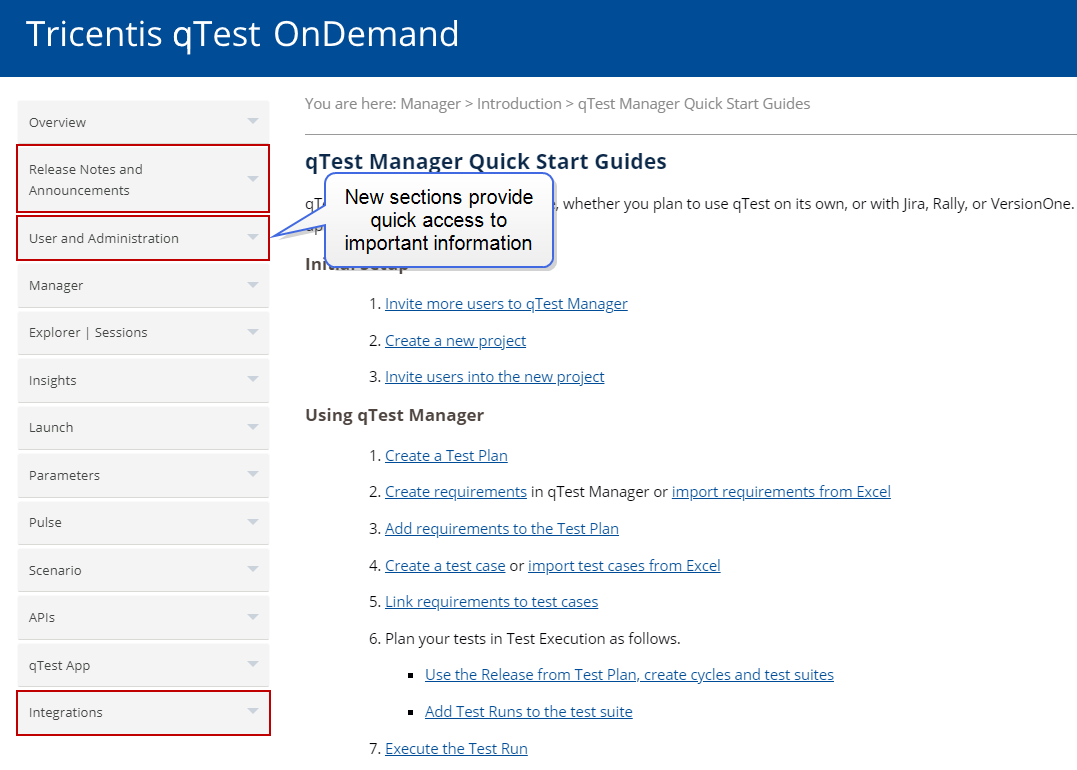
-
Centralized release notes. All qTest release notes are now centralized under the new Release Notes and Announcements heading, allowing you to quickly access release notes for every qTest product in the same location.
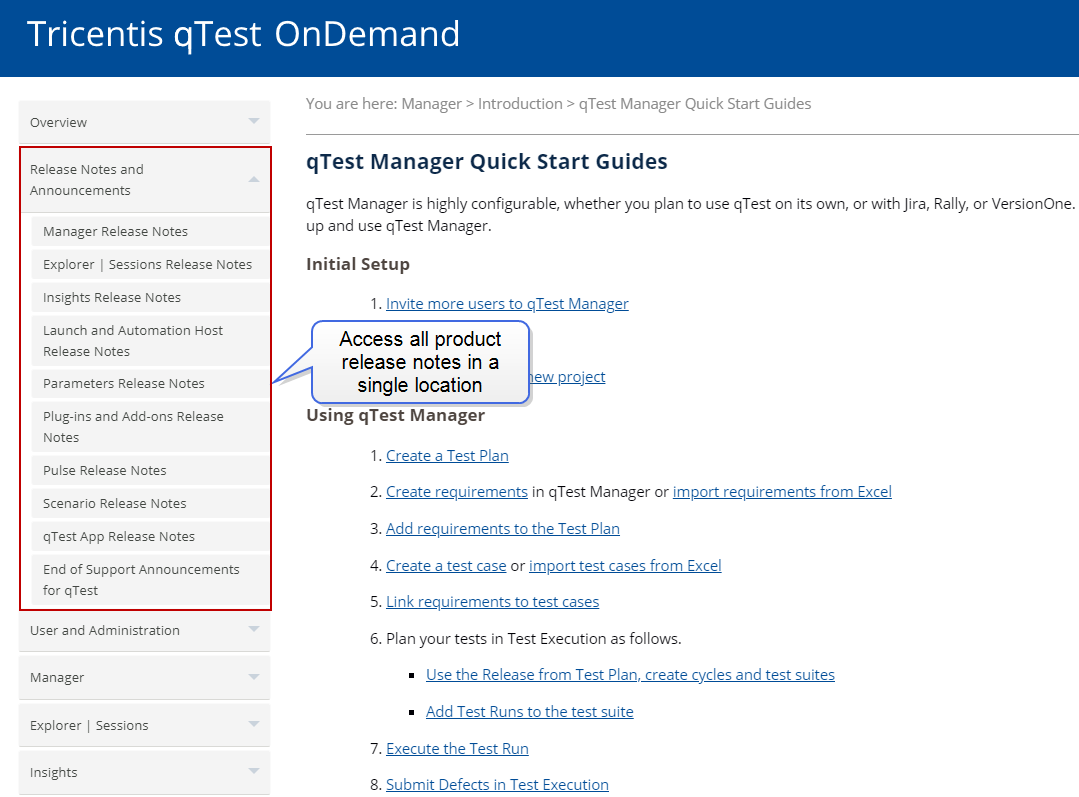
-
Organized table of contents. The table of contents now uses an updated compact layout, allowing you to view more menu items at one time. The table of contents has also been reorganized to more closely match the options and layout of the qTest UI, helping you more intuitively navigate topics based on UI area.
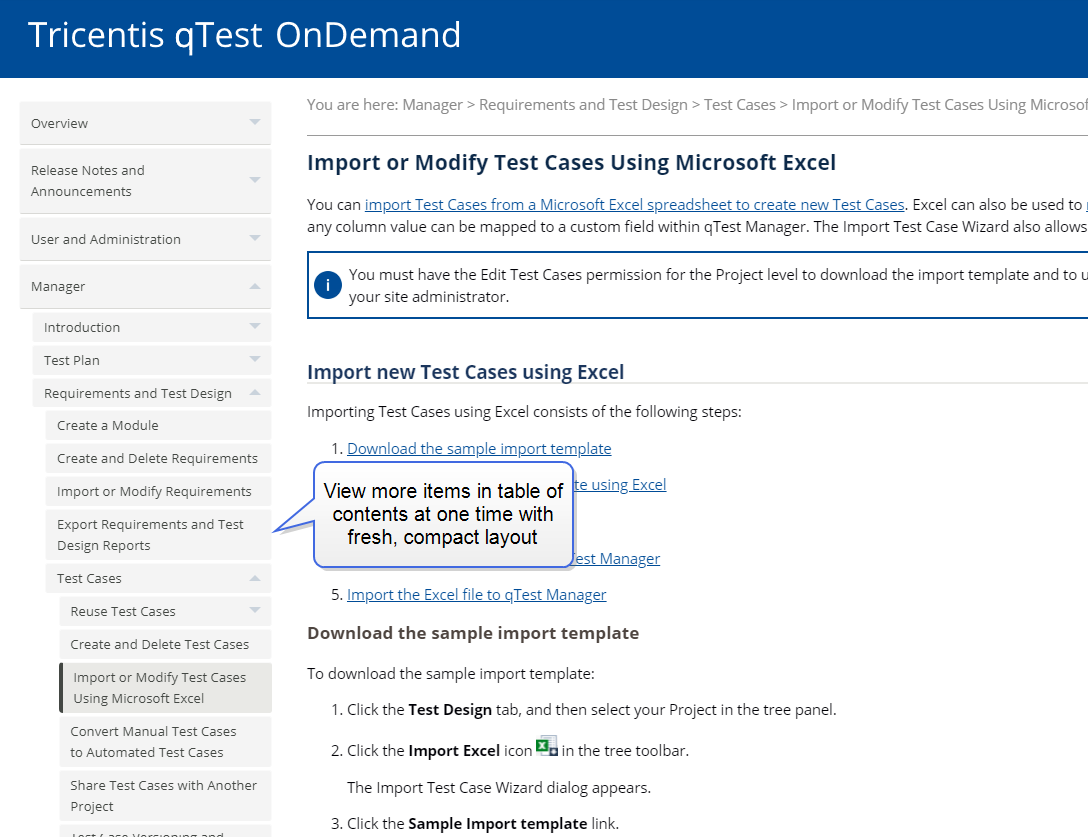
Jira integration enhancements
-
The baseURL or serverURL is now used to identify a Jira server. Previously, the clientKey was used for identification.
-
Background updates have been made to enhance the Jira queue component.
Tricentis Analytics Tech Preview integration enhancements
External issue types are now stored as text values in the Tricentis Analytics Tech Preview, allowing users to report on this data. Previously, external issue types were stored as ID numbers.
API enhancements
Search for more objects using Queries objects API
You can now search for additional object types using the Queries objects API, allowing you to obtain more qTest data using the Search API. The following object types and query options have been added to the Queries objects API.
-
Builds: ID, name, Build note, Build date, status, Release, created date, last modified date
-
Releases: Created date, last modified date
-
Test Cycles: Created date, last modified date, name, description, target Release Build, Release, Test Cycle
-
Test Logs: Execution start date, execution end date
-
Test Suites: Created date, last modified date
The following object changes are not supported.
-
Adding or updating attachments
-
Adding or updating comments
-
Linking objects, such as linking a Test Case to a Requirement
New API to query for automation Agents
A new API has been added to query for automation Agents. For example, if you want to schedule automation tests from qTest, you need a list of available automation Hosts and Agents that you can target the automation tests to. Using the new GET automation-job API, you can more easily use the CreateSchedule API to schedule the automation tests.
The new API endpoint is POST /api/v3/automation/automation-agents. This API outputs all automation Agents, including Tosca CI Agents, that meet the query and belong to Projects that the requesting user is assigned to.
Set or update Test Run properties using Submit Automation Test Log API
You can now set or update Test Run properties when submitting Test Logs using the Submit Automation Test Log API. If valid properties are provided and the Test Log is submitted to qTest, the Test Run will be updated with the properties and values, and the Test Log will be set with the properties and values.
Defects API enhancement
The Defects API now returns external issue types, such as Bug, sub-Task, and Defect, improving readibility.
Attachment file sizes now validated
Attachment file sizes are now validated for the following APIs to check whether they surpass the limit of 50 MB.
-
POST /api/v3/projects/projectId/test-runs/testRunId/auto-test-logs
-
POST /api/v3/projects/projectId/auto-test-logs?type=automation
-
POST /api/v3.1/projects/{projectId}/test-runs/{testRunId}/auto-test-logs
-
POST /api/v3/projects/projectId/test-runs/testRunId/auto-test-logs/ci/{id}
Response body converted to JSON format
API response bodies are now delivered in JSON format when the response code is 400. Previously, response bodies were delivered in text format.
Performance enhancements
-
Several database optimization changes were introduced to improve the performance of qTest Manager.
-
Background enhancements have been made to improve the integration between qTest and the Tricentis Analytics Tech Preview.
Security enhancements
-
Updates were made to comply with changes made by Atlassian to the Atlassian Connect app regarding installation lifecycle security improvements.
-
Manager is now FIPS 140-2 compliant.
-
Several security upgrades and enhancements were made to help strengthen the security posture of qTest Manager.
Bug fixes
| Ticket # | Component |
Description |
|---|---|---|
| INC0311431 | Test Execution | An issue has been fixed in which Test Case Modules were not appearing properly on the Test Execution tab. This issue has been resolved. |
| INC0299416 | Test Execution |
When adding Test Runs with a large amount of configuration values, all configurations from the Configuration field were loaded, even when the field was inactive for a Project, resulting in lagging performance. This issue has been fixed. |
| INC0300618 | Test Design | Users experienced issues when generating Excel files and merging Test Cases into one sheet. These errors have been fixed. |
| INC0303274 | Test Execution |
An issue was fixed in which Modules were not correctly importing to existing qTest Projects from Microsoft Excel if the import included Excel Sheet names that were labeled with numbers greater than 1. |
| INC0304070, INC0304490 | Jira Integration | Errors related to the Jira auto-sync feature have been fixed. |
| INC0307378 | Test Execution |
An issue was fixed in which Test Run history failed to load when switching between Test Case versions that have Test Logs and Test Case versions that do not have Test Logs. |
| INC0309260 | Test Execution |
An issue was fixed in which an error was occurring when Test Runs were filtered at the Test Release level based on Execution End Date. |
| INC0309907, INC0309625 | Tosca Integration | Issues with Tosca and qTest integration when using SSOhave been addressed. |
| INC0311431 | Test Execution |
An issue was fixed in which information for Test Case Modules was not properly appearing on Test Cycle or Test Suite pages on the Test Execution tab. |
| INC0312550 | qTest - API |
An issue was fixed in which the bearer token for qTest API access was showing an incorrect expiration date. |